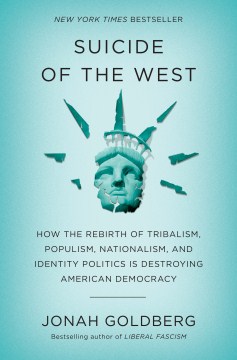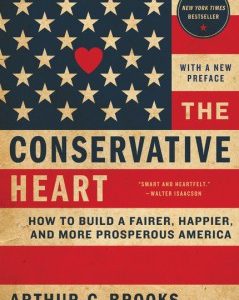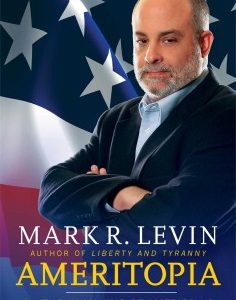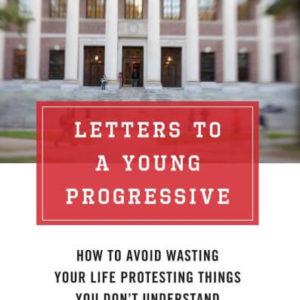Product Description
NEW YORK TIMES BESTSELLER
“Epic and debate-shifting.” —David Brooks, New York Times
“More than any book published so far in this century, it deserves to be called a conservative classic.” —Yuval Levin, National Review
With his trademark blend of political history, social science, economics, and pop culture, two-time NYT bestselling author, syndicated columnist, National Review senior editor, and American Enterprise Institute fellow Jonah Goldberg makes the timely case that America and other democracies are in peril as they lose the will to defend the values and institutions that sustain freedom and prosperity. Instead we are surrendering to populism, nationalism and other forms of tribalism.
Only once in the last 250,000 years have humans stumbled upon a way to lift ourselves out of the endless cycle of poverty, hunger, and war that defines most of history—in 18th century England when we accidentally discovered the miracle of liberal democratic capitalism.
As Americans we are doubly blessed that those radical ideas were written into the Constitution, laying the groundwork for our uniquely prosperous society:
· Our rights come from God not from the government.
· The government belongs to us; we do not belong to the government.
· The individual is sovereign. We are all captains of our own souls.
· The fruits of our labors belong to us.
In the last few decades, these political virtues have been turned into vices. As we are increasingly taught to view our traditions as a system of oppression, exploitation and “white privilege,” the principles of liberty and the rule of law are under attack from left and right.
At a moment when authoritarianism, tribalism, identity politics, nationalism, and cults of personality are rotting our democracy from within, Goldberg exposes the West’s suicidal tendencies on both sides of the ideological aisle. For the West to survive, we must renew our sense of gratitude for what our civilization has given us and rediscover the ideals that led us out of the bloody muck of the past – or back to the muck we will go.
Suicide is painless, liberty takes work.
Excerpt
1
Human Nature
Our Inner Tribesman
Human nature is real. Few statements are less controversial among the people who study the subject and more controversial among people who don’t.
It is fair to say that no reputable psychologist, neuroscientist, linguist (including Noam Chomsky), or economist disputes the fact that human beings come preloaded with a great deal of software. Indeed, the fashionable metaphor today is not software but “apps”--as in the applications we have on our smartphones. Different situations trigger different apps, and sometimes these apps can be in conflict.
All of the serious debates about nature versus nurture start with the premise that there is already a lot built into our nature. The only question is what we can add on top of nature or what apps we can override. Think of a car. We all generally agree that a car comes with an engine, four wheels, and a steering wheel. These things come standard. That’s nature. Nurture provides the options, and there are a great many options. But no matter how many add-ons you buy, a car is not going to be a helicopter.
In his enlightening book Just Babies: The Origins of Good and Evil, psychologist Paul Bloom chronicles a remarkable number of experiments conducted on infants and toddlers. (Rest assured: No babies were harmed in the process.) He demonstrates that babies as young as six months already come preloaded with a number of psychological traits that suggest an innate moral sense. For instance, infants between six and ten months old were shown puppet plays. One puppet would be trying to get up a hill. Another puppet would either come to the hill-climbing puppet’s aid or it would get in the way, stymieing the climber’s efforts. Afterward, the babies were given a choice between the mean puppet and the nice puppet. The babies almost uniformly preferred the nice puppet over the jackass puppet. When a similar study was performed with twenty-month-old toddlers, the kids would reward the nice puppet with candy and punish the bad puppet by taking its candy away.1 Other studies confirm that we are all born with some very basic programming about empathy, altruism, cooperation, and other moral intuitions.
Bloom takes great care in pointing out that, just because we are born with a kind of moral sense, that doesn’t mean we are therefore moral. Rather, we are born with moral taste buds. How we use them depends on the environment we grow up in and, crucially, how we define “morality.”
One of the most important findings of not just Bloom but thousands of researchers across numerous disciplines is that we are all born with a natural distrust of strangers. Very young babies can identify language; their cries even have regional accents. “Young babies can recognize the language that they have been exposed to, and they prefer it to other languages even if it is spoken by a stranger,” Bloom reports. “Experiments that use methodologies in which babies suck on a pacifier to indicate their preferences find that Russian babies prefer to hear Russian, French babies prefer French, American babies prefer English, and so on. This effect shows up mere minutes after birth, suggesting that babies were becoming familiar with those muffled sounds that they heard in the womb” [emphasis mine].2
Interestingly, our brains dedicate an enormous amount of resources to facial recognition. We are born with an intense interest in human faces. No doubt there are many reasons for this. For instance, much early human communication was done nonverbally and that’s still true for humans today, particularly before we learn to speak. One can debate whether reading faces was important in the past or today, but our ability to recognize faces was clearly more vital in the past. Being able to instantly recognize kin or friends from strangers could mean the difference between life and death. (It’s telling that our ability to identify faces is actually much more sophisticated than our ability to verbally articulate the differences between faces. Most of us can instantly distinguish between, say, Matt Damon’s face and Matthew McConaughey’s. But can you instantly explain what makes their faces so different?)
The desire for unity and distrust of strangers are universal human tendencies--but just tendencies. While I don’t think they can be wholly taught out of us, they certainly can be tempered and channeled in productive ways. It is a common cliché among certain tribes of humanists to say something like “There is no race but the human race,” which of course is just a more secular version of “We are all children of God” and similar endearing platitudes. All things being equal, I think this is a benign cliché and worth incorporating into our civilizational dogma. But I should point out that, of all the systems ever created that actually put this belief into practice, none has been more successful on the ground than the market. The market lowers the risk--or “price”--of distrust by letting very different peoples and cultures find common interest.
The distrust of strangers and the craving for unity are important themes in this book, because they illuminate a much broader fact: Ideology is downstream of human nature. Children and adults are constantly told that one needs to be taught to hate. This is laudable nonsense. We are, in a very real sense, born to hate every bit as much as we are born to love. The task of parents, schools, society, and civilization isn’t to teach us not to hate any more than it is to teach us not to love. The role of all of these institutions is to teach what we should or should not hate.
Bloom writes that “just about all the readers of this book believe that it’s wrong to hate someone solely because of the color of his or her skin. But this is a modern insight; for most of human history, nobody saw anything wrong with racism.”3 All good people are supposed to hate evil, but the definition of what constitutes evil is rather expansive across time, and refining the definition of evil is the very essence of what civilizations do.
Every culture ever known has things it hates and things it loves. And every political ideology ever known has some group it considers the Other. The pro-Nazi philosopher Carl Schmitt famously said, “Tell me who your enemy is, and I will tell you who you are.”4 Fascism is supposedly defined by its demonization of “the other.” Obviously, in Nazi Germany, the Other was best represented by the Jew. But communism had its Others too. They went by such names as the bourgeois, or the ruling class, or the kulaks. Contemporary liberalism has a host of Others it hates. We’ve all probably met avowed lovers of tolerance who talk about how much they hate intolerant people--but only certain kinds of intolerant people. I’ve lost count of the number of times I’ve heard people insist that the slightest prejudice against Muslims is evil and then proceed to explain how awful evangelical Christians are.
The anthropologist Richard Shweder compiled a useful list of things that different societies have thought was praiseworthy, neutral, or appalling:
masturbation, homosexuality, sexual abstinence, polygamy, abortion, circumcision, corporal punishment, capital punishment, Islam, Christianity, Judaism, capitalism, democracy, flag burning, miniskirts, long hair, no hair, alcohol consumption, meat eating, medical inoculations, atheism, idol worship, divorce, widow marriage, arranged marriage, romantic love marriage, parents and children sleeping in the same bed, parents and children not sleeping in the same bed, women being allowed to work, women not being allowed to work.5
In other words, the capacity for humans to think certain things are “naturally” good or bad is remarkably elastic. But there’s a difference between elastic and infinite. For example, incest has been a taboo everywhere. Obviously the strength of that taboo has varied, but no society has celebrated it. (Alas, that taboo has been steadily weakening in American popular culture.) Similarly, there’s no society in the world--now or known to have existed--where people didn’t give preference to relatives and friends over strangers, a point I’ll be coming back to quite a bit in later chapters.
Anthropologist Donald E. Brown compiled a list of attributes that describe “the Universal People”--i.e., everybody, everywhere. “Human universals--of which hundreds have been identified--consist of those features of culture, society, language, behavior, and mind that, so far as the record has been examined, are found among all peoples known to ethnography and history.”6 The list is too long to reprint here. But some of the most important, for our purposes at least, include coalitions; conflict; cooperation and cooperative behavior; corporate statuses; collective decision making; divination; ethnocentrism; entification (treating patterns and relations as things); envy; etiquette; fear; feasting; folklore; food sharing; gift giving; gossip; government; group living; (collective) identity; in-groups (as distinguished from out-groups); in-group biases in favor of close kin (as distinguished from distant kin groups); kin terms translatable by basic relations of procreation; kinship statuses; judging others; law (rights and obligations); law (rules of membership); leaders; magic; magic to increase life; magic to sustain life; male and female and adult and child seen as having different natures; males dominating the public/political realm; males more aggressive; males more prone to lethal violence; males more prone to theft; moral sentiments; myths; narrative; overestimating objectivity of thought; planning; planning for the future; preference for own children and close kin (nepotism); prestige inequalities; private inner life; promise; property; psychological defense mechanisms; rape; rape proscribed; reciprocal exchanges (of labor, goods, or services); reciprocity, negative (revenge, retaliation); reciprocity, positive (recognition of individuals by face); redress of wrongs; rites of passage; rituals; role and personality seen in dynamic interrelationship (i.e., departures from role can be explained in terms of individual personality); sanctions; sanctions for crimes against the collectivity; sanctions including removal from the social unit; self distinguished from other; self as neither wholly passive nor wholly autonomous; self as subject and object; self as responsible; self-image, awareness of (concern for) what others think; self-image, manipulation of; self-image, wanted to be positive; social structure; socialization; socialization expected from senior kin; socialization includes toilet training; spear; special speech for special occasions; statuses and roles; statuses ascribed and achieved; statuses distinguished from individuals; statuses based on something other than sex, age, or kinship; succession; sweets preferred; symbolism; symbolic speech; taboos: tabooed foods; tabooed utterances; taxonomy; territoriality; trade; and turn taking.
Again, this is only a partial list.
One of the most interesting taboos in American life is the taboo against discussing human nature. This is an entirely modern prohibition. The ancient Greeks and Romans, not to mention every major world religion, considered human nature not only real but an essential subject for study and contemplation. I think there are multiple overlapping reasons--many of them laudable--for our aversion to the subject. Our civilization has struggled to live up to the ideals of universal equality enshrined in the Declaration of Independence, the U.S. Constitution, and similar canons. Discussion of human nature inevitably bleeds into debates about genetic differences between groups or claims that certain behaviors or choices are “unnatural.” Discussion of human nature also grinds against the idea that the individual is unconstrained by external--or internal!--restraints, a nearly unique dogma of the West. Another reason why “human nature” sounds like fighting words is that it is at loggerheads with the French Enlightenment tradition that believes in the “perfectibility of man.”
But while some of these concerns are valid, the fact is the human universals identified by Brown apply to blacks and whites, Asians and aborigines. I am agnostic about the issue of racial differences, in part because I’m not clear on why they should matter even if they exist. Most of the good work on the subject--there’s a great deal of awful work as well--focuses on large aggregate and statistical differences between populations. Whatever may or may not explain these differences has no bearing whatsoever on how we should treat individuals as a matter of law, manners, or morality.
But one of the sources of the taboo against discussions of human nature does need addressing: the idea of the noble savage.
Jean-Jacques Rousseau is often credited with coining the phrase “noble savage,” though that honor belongs to John Dryden, who wrote in The Conquest of Granada (1670):
I am as free as nature first made man,
Ere the base laws of servitude began,
When wild in woods the noble savage ran.7
“The concept of the noble savage was inspired by European colonists’ discovery of indigenous peoples in the Americas, Africa, and (later) Oceania,” Steven Pinker writes. “It captures the belief that humans in their natural state are selfless, peaceable, and untroubled, and that blights such as greed, anxiety, and violence are the products of civilization.”8
Again, Rousseau didn’t coin the term, but he was the great popularizer of this myth. He wrote in 1755:
So many writers have hastily concluded that man is naturally cruel, and requires requires civil institutions to make him more mild; whereas nothing is more gentle than man in his primitive state, as he is placed by nature at an equal distance from the stupidity of brutes, and the fatal ingenuity of civilised man.9
“Rousseau reversed the poles of civilization and barbarism,” writes Arthur Herman. “His paeans of praise for primitive man, the ‘noble savage’ . . . who lives in effortless harmony with nature and his fellow human beings, were meant as a reproach against his refined Parisian contemporaries. But they were also a reproach against the idea of history as progress.”10 For Rousseau, the advent of private property, the development of the arts, and the general advancement of human health and prosperity were actually giant steps backward.
1. Paul Bloom, Just Babies: The Origins of Good and Evil (New York: Broadway Books, 2013, Kindle edition), pp. 23-29.
2. Ibid., pp. 110-111.
3. Ibid., p. 14.
4. Carl Schmitt, Glossarium: Aufzeichnungen der Jahre 1947-1951, Eberhard Freiherr von Medem, ed. (Berlin: Duncker & Humblot, 1991), pp. 4-5, 243. Quoted in Claudia Koonz, The Nazi Conscience (Cambridge, MA: Belknap Press/Harvard University Press, 2003), p. 293.
5. Bloom, Just Babies, p. 15.
6. Donald E. Brown, “Human Universals, Human Nature & Human Culture,” Daedalus 133, no. 4 (special issue: “On Human Nature,” Fall 2004), pp. 47-54.
7. Steven Pinker, The Blank Slate: The Modern Denial of Human Nature (New York: Penguin Publishing Group, 2003 [2002], Kindle edition), p. 6.
8. Ibid.
9. Jean-Jacques Rousseau, “The Second Part,” sec. 207, “A Dissertation on the Origin and Foundation of the Inequality of Mankind,” The Social Contract and Discourses, Online Library of Liberty, 1761. http://oll.libertyfund.org/titles/rousseau-the-social-contract-and-discourses#lf0132_head_066
10. Arthur Herman, The Idea of Decline in Western History (New York: Free Press, 1997), p. 29.



